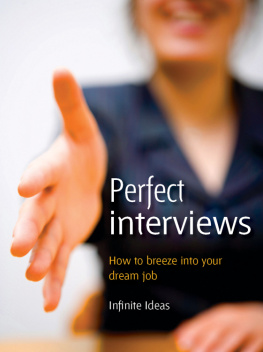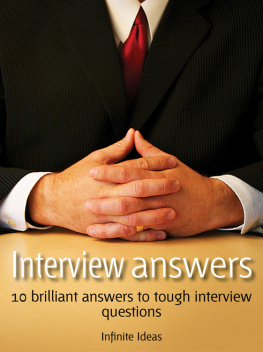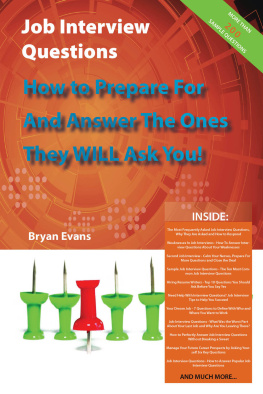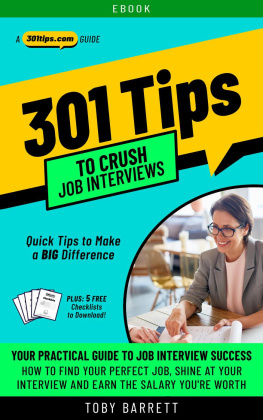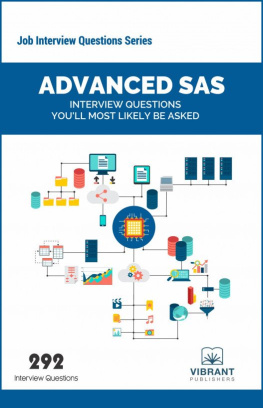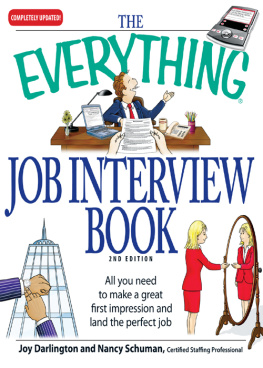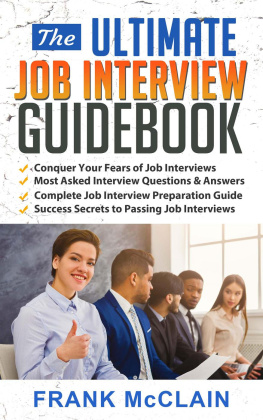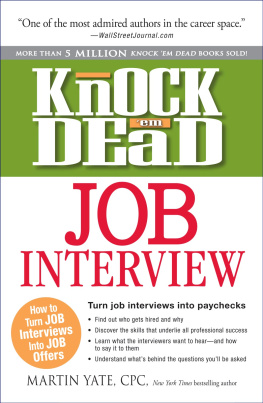Perfect interviews
How to breeze into your dream job
Infinite Ideas

8. What is the one thing your team would most like to change about you?
Knowing yourself, or self-insight, is crucial. The answer to this question tells the interviewers a lot about you, probably including a hint of your main weakness.
Pick the thing to be changed carefully and turn a vice into a virtue.
Lets look first on the negative side. What they are probing for here is any trait of yours that really is a red light for them not to go ahead with you. So avoid showing them any problem that might be a deal breaker.
Use ancient history
Quite a neat way of handling this is to talk about a weakness that youve had in the past, one that youve overcome but that you remain on guard for. A manager once pointed out to me that I was causing some discomfort to my team when I acted too precipitately when they came to me with a problem. I thought about it and realised that I sometimes listened to a problem and quickly proposed a solution. I might then volunteer to take the first action myself. At that point Id pick up the phone there and then to put the action plan into progress. I talked to the team about it and they agreed that it was frustrating for them because they wanted to go away, think about the plan and sort the problem out themselves. I think Ive fixed it and dont do it now; but Im aware of the tendency and watch myself carefully in those circumstances.
This is a reasonable answer and one that shows your ability to act on criticism. Which is pertinent to another question in the area of self-insight which often comes up: How do you react when your manager or a team member tells you that they dont like something you do? Now, nobodys perfect and such criticism happens to everyone. Its crucial that you display real interest in the feedback and take some action to show that you are putting things right. Theres no need, however, to suggest to an interviewer that such things happen very often.
Ive come to know that whatever the criticism that people are making, there is always something in it; so I never argue about it or attempt to justify my position. In order to learn from it, Ive found that you need to talk it over thoroughly, to make sure that youre both talking about exactly the same thing. When I do that, its normally pretty easy to modify how I behave. If I then invite them to point out any reoccurrences I find that the discussion ends up useful and amicable.
Pick something they actually quite like
This depends on your function. Every job has a bit in it that people dont like or see as a low priority. For a salesperson its easy. No one likes doing the paperwork. Often in a rather macho way, people regard it as getting in the way of the real work the selling work. Once again present the issue as something you know you have to continuously overcome.
I know I have a tendency to get a bit behind with the paperwork. I also know that it can upset the office people terribly and, if left undone for long enough, can lead to missed deliveries and customer dissatisfaction. So, Ive put a severe discipline on myself to keep up to date every Wednesday afternoon when a lot of my customers are closed. Whatever your function you can probably find your version of the salespersons paperwork.
Defining idea
Work expands so as to fill the time available for its completion.
C. Northcote Parkinson
9. What is the ideal culture that you like to find in an organisation?
Youre sitting there; so you must have decided that you quite like what you believe to be their culture. Just describe your ideal place to work and if youve analysed them correctly youll be describing their culture as well.
Youve got to be open and honest here. If the cultures not right, youll eventually hate the job. You really are looking for compatibility.
Regardless of your how well you fit the job and the job fits you, the thing that makes the organisation successful and you happy is the culture. Its the context within which everyone works. Use the interview to check that you understand the way they work and that youll enjoy fitting into it.
Theres no right answer
Lets start with an easy one. If youre a very creative person dont go for a company thats very process driven and where strict attention to the rules and the small print is part of their function. Much of a lawyers job is the careful interpretation of other peoples writing. Maybe not right for someone who fancies herself as an innovator. So to prepare for this question define the elements of an organisations culture that concern you. The list below gives you some cultural attributes to help you to do this:
- Bureaucratic vs. meritocratic and open . On one end of this scale is the organisation that normally promotes through length of time in the job. You cant go from level 5 to staff level 6 without working there five years. You cant get to level 6 at all unless youre a graduate. The mark of a meritocracy is that high-fliers are put into challenging positions at the first opportunity. Openness tends to go with meritocratic. (The dining rooms are often a quick guide to all this: are they segregated by seniority or does everyone muck in at the same canteen?)
- Internal vs. external focus . Do you want to work in an environment where your plans are pretty much dictated by the level above you, or do you want to drive your plans by thinking about what the external customer wants?
- Quality/cost balance . Do you want to work in Rolls Royce, or do you want to work for a company thats increasing its efficiency so much that they can offer good products to a mass market?
- Freedom vs. process and control . Are you a risk-taking maverick who likes to spot an opportunity, go for it and ask permission afterwards? If so, youre not going to be comfortable in an environment where any step out of line is met with raised eyebrows. Many people are more comfortable in an organisation that lets them know precisely where they are and what their sphere of operation and influence will be.
- Fun vs. serious . What does it feel like when you walk in the door and talk to people? By fun we dont mean frivolous, but some organisations take themselves less seriously than others.
- Open vs. closed communication . Do they give a lot of information to a wide audience, or do they inform only those who need to know?
- Team vs. individual . Does the organisation operate through its teams, or through its individuals?
Now mark on a scale of 110 how you think the organisation youre applying to works against your list of attributes. Also mark on a scale of 110 how the culture suits you. Where you cant answer the question through lack of knowledge, make a note to ask a question in that area at the interview.
Is what they do what they say they do?
Sometimes companies proclaim their culture as one thing and actually act in a completely opposite way. You can check on this in the interview: In your company accounts it says that everyone in the organisation is encouraged to be innovative. How does that work? If they say that their customers drive everything they do, you could ask, What processes do you have in place to check on the changing requirements of your customers?
We care about our people!!!!
This is a frequent Do what I say and not what I do area. Its amazing how often the chairmans statement in the annual report contains something like In the end our greatest assets are our people and I want to express my thanks to them for all their hard work while somewhere else in the same report its noted that the downsizing exercise has gone well.
Next page
